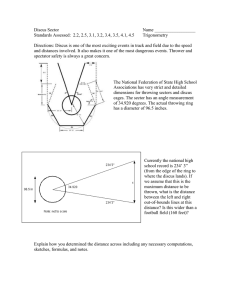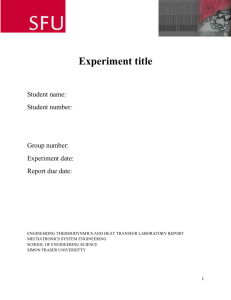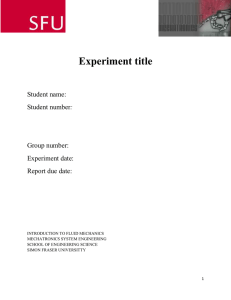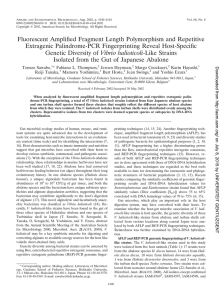Developing Institutional and Social Capacities for Urban Sustainability
advertisement
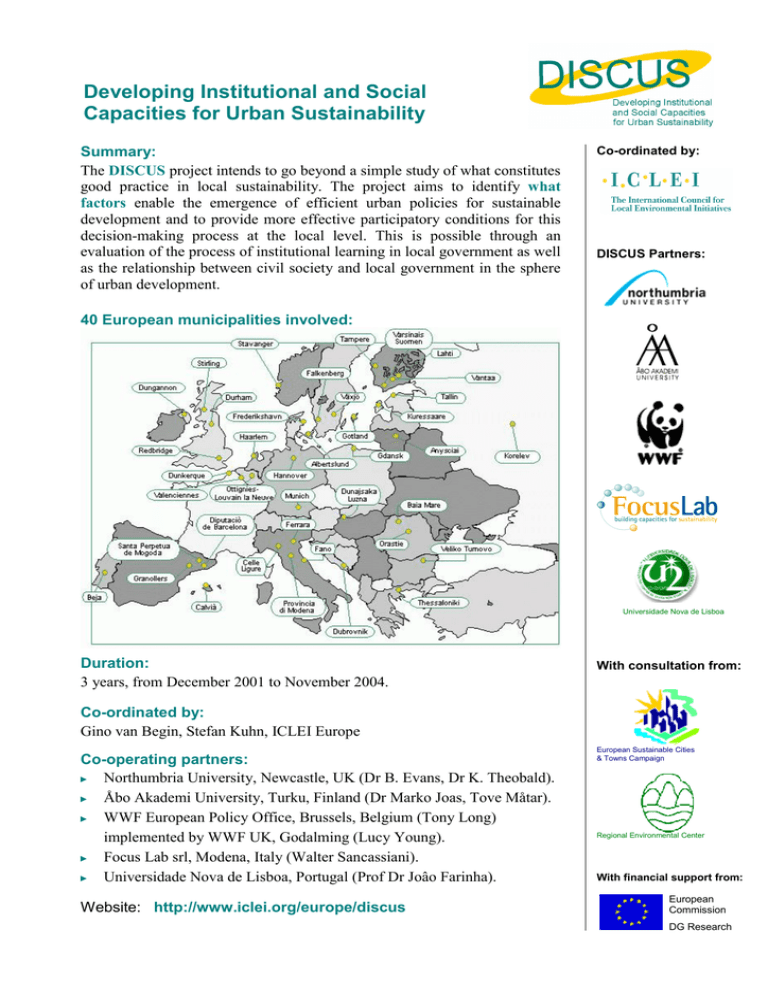
Developing Institutional and Social Capacities for Urban Sustainability Summary: The DISCUS project intends to go beyond a simple study of what constitutes good practice in local sustainability. The project aims to identify what factors enable the emergence of efficient urban policies for sustainable development and to provide more effective participatory conditions for this decision-making process at the local level. This is possible through an evaluation of the process of institutional learning in local government as well as the relationship between civil society and local government in the sphere of urban development. Co-ordinated by: DISCUS Partners: 40 European municipalities involved: Universidade Nova de Lisboa Duration: 3 years, from December 2001 to November 2004. With consultation from: Co-ordinated by: Gino van Begin, Stefan Kuhn, ICLEI Europe Co-operating partners: ► Northumbria University, Newcastle, UK (Dr B. Evans, Dr K. Theobald). ► Åbo Akademi University, Turku, Finland (Dr Marko Joas, Tove Måtar). ► WWF European Policy Office, Brussels, Belgium (Tony Long) implemented by WWF UK, Godalming (Lucy Young). ► Focus Lab srl, Modena, Italy (Walter Sancassiani). ► Universidade Nova de Lisboa, Portugal (Prof Dr Joâo Farinha). Website: http://www.iclei.org/europe/discus European Sustainable Cities & Towns Campaign Regional Environmental Center With financial support from: European Commission DG Research Project Description Developing Institutional and Social Capacities for Urban Sustainability The DISCUS project aims to understand the conditions leading to the emergence of efficient governance for urban sustainable development in Europe. This should enable the improvement and development of institutional capacity and social capital at the local level and to achieve more effective and participatory decision-making processes. The DISCUS research has three main objectives: ► ► ► To assess which factors and conditions enable the development of organisational capacities for addressing sustainable development requirements at the local government level; To evaluate the impact of participatory measures on the level of involvement of different stakeholders in decision making processes; To understand interactions between local government institutions and civil society in the achievement of sustainable urban development as well as the conditions enabling improved communication networks and capacity building. ∇ The objectives will be met through six steps: ➋ A review of the evidence of factors and conditions which can lead to effective urban governance and decision making for sustainable development, through an assessment of recent capacity building projects and research and the evaluation of the theoretical context for urban governance and decision making. ➋ The identification of criteria for selecting the 40 case study cities: developing the research methodology and the fieldwork programme and defining a panel of practitioners composed of 5 local authorities acting as external advisors. ➋ Conducting a programme of research in 40 different European local authorities to identify factors leading to sustainable urban governance through document analysis, interviews with key actors’, and questionnaires. ➋ Analysing data and identifying factors and conditions for effective urban governance for sustainable development. Produce the report “Developing Institutional and Social Capacity for Urban Sustainability: Evaluating European Policy Practices”. ➋ Developing guidelines for local authorities and stakeholders and preparing a “Policy Guidance for Effective Governance for Sustainability” for local authorities. ➋ Disseminating the research findings through a DISCUS international conference, a web-based sustainable resource centre for sustainable urban and partners’ action. ∇ The DISCUS project should provide the following outcomes: ► ► ► The development and advancement of conceptual knowledge on sustainable urban governance. The production of a theoretical model of urban governance for sustainable development. This model will focus on the processes of institutional learning including the development of institutional capital in local government and social capital capacity building in the sphere of civil society. The publishing of policy guidelines for effective urban governance. The DISCUS project is co-funded by the European Commission’s Directorate General for Research: Fifth Framework Program, 1998-2002, Thematic Programme: Energy, Environment and Sustainable Development, Key Action: “City of Tomorrow and Cultural Heritage.”
